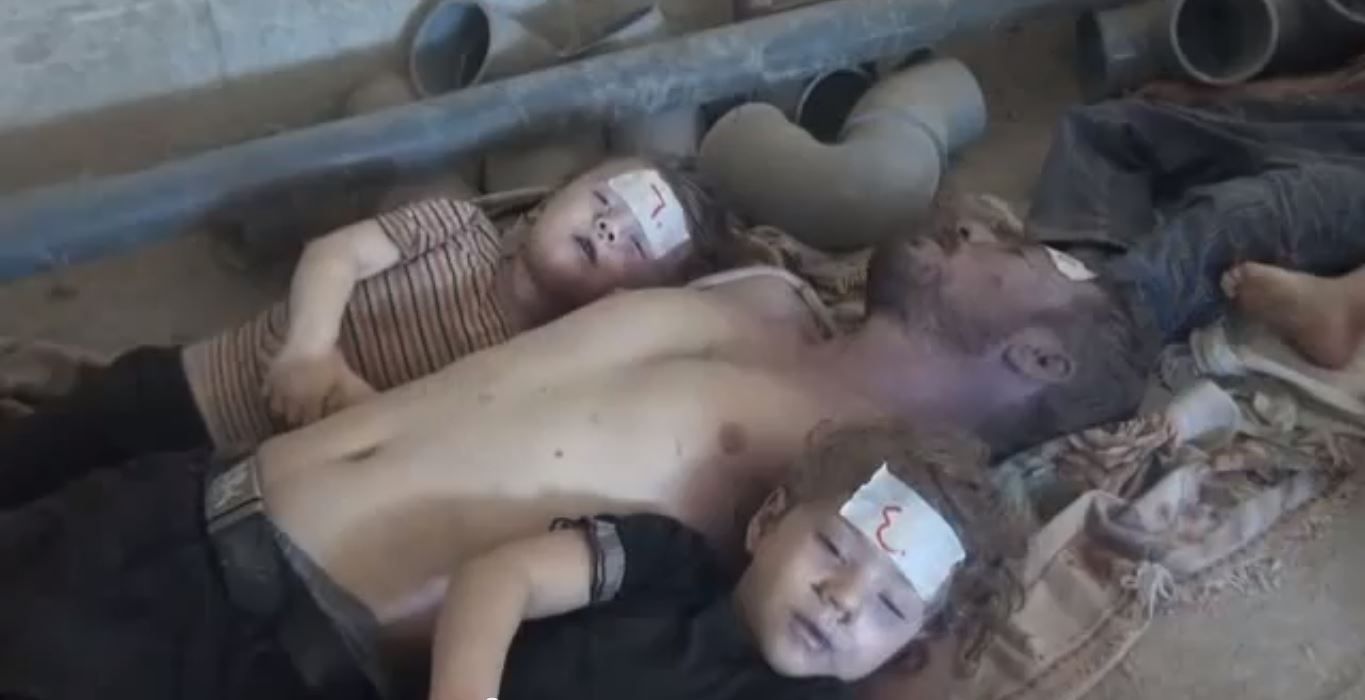Note to Syrian rebels: Give up Assad’s chemical weapons and prosecute those who used them
By Doniyor Mutalov | December 24, 2024
 More than 500 metric tons of a precursor chemical for the nerve agent sarin were removed from Syria and destroyed by a US Army field team aboard the M/V Cape Ray as the ship sailed in international waters in August 2014. Credit: Jack Bunja / US Army DEVCOM CBC
More than 500 metric tons of a precursor chemical for the nerve agent sarin were removed from Syria and destroyed by a US Army field team aboard the M/V Cape Ray as the ship sailed in international waters in August 2014. Credit: Jack Bunja / US Army DEVCOM CBC
The collapse of the brutal Assad regime in Syria opens a new chapter for the embattled country. To break with past atrocities, Syria’s current leaders should renounce chemical weapons, and the international community should require any new Syrian government to hand over all chemical arms and allow inspectors to confirm their absence.
The rebels who ousted Assad are led by Hayat Tahrir al-Sham, which the United Nations Security Council has designated as a terrorist group. In a statement published during the blitz on the Syrian capital of Damascus, the rebels emphasized that they had no interest in the Assad regime’s chemical arms. They indicated their willingness to coordinate with relevant stakeholders to monitor weapons and sensitive sites in Syria, and they offered assurances that they would not use any weapon banned under international law. But in the days to come, the world needs to judge the rebels by deeds, not words.
Syria’s history of chemical disarmament efforts. Syria’s chemical arsenal was developed in the 1980s to maintain “strategic parity” with Israel. But it was not until the 2010s that the world learned about the existence of these weapons. The risk of chemical weapons falling into the hands of terrorists has been at the top of the agenda of numerous countries since the start of the Syrian civil war in 2011.

In 2013, chemical attacks on Aleppo and Ghouta claimed the lives of more than 1,400 people. These attacks were attributed to government forces, and an intense diplomatic crisis ensued. The worst has been averted, thanks to a diplomatic settlement between the United States and Russia in September 2013. As part of that arrangement, Syria joined the Chemical Weapons Convention, and the Executive Council of the Organisation for the Prohibition of Chemical Weapons (OPCW) later adopted a schedule for the elimination of all chemical weapons precursors.
The UN Security Council approved the OPCW decision and made all provisions binding upon Syria. The verification mission confirmed the destruction of 1,300 tons of declared chemical warfare material by September 2014. It concluded its work promptly, partly because of the fear of repeating the sort of “cat and mouse” games that plagued the work of inspectors in Iraq in the 1990s. Initially, disarmament seemed like a resounding success; the OPCW was even awarded a Nobel Peace Prize in 2013, partly because of the publicity about its success in Syria. In the past decade, however, there has been significant skepticism about whether Syria’s rushed declaration of its arsenal was a comprehensive and accurate description of all relevant information.
Flagrant violations. In 2015 and 2016, after the alleged elimination of all chemical weapons, new reports surfaced about chlorine attacks attributed to both rebels and government forces. At the time, most of these attacks did not involve nerve agents, which are considered the most dangerous chemical weapons. It was not until April 2017 that the nerve agent sarin, the one used in Ghouta, was used again in Khan Shaykuhn, killing over 80 people. The OPCW monitoring body again identified the Syrian government as the culprit. Within a year, chemical weapons were employed again in Douma by government forces, this time in an attack using chlorine.
Numerous instances of chemical weapons use after 2014 confirm that Syria’s then-rulers did not fully declare and destroy all chemical agents and instead hid certain parts of the program. Some chemical agents and several sites were not officially disclosed and remained sealed to inspectors. The Syrian government continued to deny concealment or responsibility for the use of chemical arms until as late as last month’s OPCW review conference, during which Syria’s representative made deceptive claims about its compliance with the Chemical Weapons Convention.
In light of the flagrant violations, the OPCW’s Executive Council adopted a decision in 2020 requiring Syria to declare all chemical weapons, disclose the locations of chemical weapons-related facilities, resolve all outstanding issues regarding implementation of the Chemical Weapons Convention, and grant inspectors full and unfettered access. The OPCW gave Syria 100 days to comply, but Syria failed to do so.
In 2021, the OPCW suspended Syria’s rights and privileges, including, but not limited to, voting rights in the organization. At their 2023 annual meeting, state parties to the Chemical Weapons Convention further decided that, in light of the continuing breaches of the treaty by Syria, they would prevent the sale or transfer of dual-use chemical items. In a statement published on December 9, after the fall of Assad, the OPCW reiterated that Syria’s “declaration of its chemical weapons programme still cannot be considered as accurate and complete” and vowed its readiness “to engage further on these matters with relevant Syrian authorities and international partners.”
The next chapter. Today, Syria remains noncompliant with the Executive Council’s 2020 decision and the earlier Security Council resolution. Any engagement with the new Syrian government should, therefore, emphasize that it must fulfill these obligations by making a full and complete declaration of all chemical weapons and facilities, allowing inspectors to access any site of interest, and addressing any inconsistencies, gaps, or discrepancies that were identified during the previous regime.
Compliance would be preferable to military strikes like those already conducted by the United States and Israel, since kinetic attacks can release toxic chemicals into the air, endanger the health of civilians, and contaminate the environment for years to come. Open-air detonations are also strongly discouraged by the OPCW, which prefers incineration or neutralization as methods for destroying chemical weapons and their precursors. Chemical weapons must be disposed of safely and securely.
In the interests of reconciliation and transitional justice, the new government should also be encouraged to investigate instances of chemical attacks and bring their perpetrators to justice with the help of evidence-gathering entities such as the International, Impartial, and Independent Mechanism established by the UN General Assembly in 2016, and OPCW bodies such as the organization’s Identification and Investigation Team and Fact-Finding Mission.
The use of chemical weapons is a war crime under the Rome Statute and international criminal law. Syria, however, is not a party to the Rome Statute instituting the International Criminal Court. Still, the UN Security Council, under its exceptional powers, can refer the Syrian situation to the Court, as it previously did for Darfur and Libya. As a court of last resort, the International Criminal Court would act only if the current Syrian authorities were unable or unwilling to genuinely investigate or prosecute those responsible for chemical weapons use.
If Syria’s new government wishes to start a new chapter, it would be well advised to forego the prohibited weapons of the preceding dictator and prosecute those implicated.
Together, we make the world safer.
The Bulletin elevates expert voices above the noise. But as an independent nonprofit organization, our operations depend on the support of readers like you. Help us continue to deliver quality journalism that holds leaders accountable. Your support of our work at any level is important. In return, we promise our coverage will be understandable, influential, vigilant, solution-oriented, and fair-minded. Together we can make a difference.
Keywords: OPCW, Syria, chemical weapons, rebels
Topics: Nuclear Weapons, Opinion, Voices of Tomorrow
















Interesting article. However, it should be equally important to establish multilateral redirection mechanisms towards civilian activities (for instance, for pharmaceutical programs) of the Chemical Weapons specialists under the Assad regime in order to avoid knowledge proliferation toward terrorists organizations. In Syria’s CERS, there are about a 20.000 of these experts. Assuming a payment for their reemployment about 200 USD par year, this sort of “Syrian Science and Technology Center (SSTC)” should cost about 4Mil USD/year at a rate cost 200USD/year par person. In the past a similar redirection program was established for the former Soviet scientists, and similarly for the… Read more »